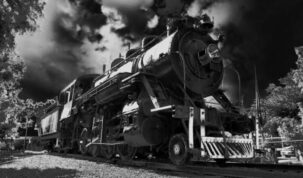On March 28, 1918, Germany’s Spring Offensive sent thousands to their deaths in WWI’s trenches. Wilfred Owen, in Parable of the Old Men and the Young, twisted Genesis 22 into a protest: leaders sacrificed youth for pride, not God. Today, as new ‘Isaacs’ die in global conflicts, Owen’s question lingers. Will we ever learn?
“And stretched forth the knife to slay his son.…” Parable of the Old Men and the Young is a poem written by Wilfred Owen, a World War I poet and soldier, inspired by Genesis 22. The Old Testament, written between 1660 – 400 B.C, tells the story of Genesis 22: Abraham, the father of Isaac, will sacrifice his son as an offering after God has asked him to do so, but an angel of the Lord stops him, and Abraham sacrifices a ram instead. The poet Wilfred Owen has borrowed from Genesis 22 the outline of the story, excluding certain actions, dialogues, subtracting or adding words, and changing the ending to give his poem a sense of how politicians acted during the WWI which we remember today.
The first difference noticed when reading both texts is how the poem never mentions God’s calling to Abraham. While Genesis 22 reads “Then God said, “take your son, your only son, whom you love- Isaac- and go to the region of Moriah, Sacrifice him there as a burnt offering on a mountain I will show you.””, Parable of the Old Men and the Young narrates, “So Abraham rose, and clave the wood, and went, and took the fire with him, and a knife”. In Genesis 22, there are two characters, God and Abraham, the prior testing the other; meanwhile, in the poem, God’s calling is never mentioned, we could say it skips over to Abraham’s faithful obeying being the first action. The fact that the first word in the poem is “So” may seem as if something had happened previously but is left out, this being God’s calling to Abraham, an action we can only know about if we have read the story of Genesis 22. Owen’s incredibly executed purpose in doing so, is to make the reader feel “blindfolded” just as Isaac and the soldiers, sent to fight during WWI, felt following orders with no explanation.
Abraham’s son is the second character the texts have in common, and in both, he questions his father as to where the lamb for their offering is. The 15th line from Genesis 22 reads ““The fire and wood are here,” Isaac said, “but where is the lamb for the burnt offering?”” and his father answers “God himself will provide the lamb for the burnt offering my son.”. In Owen’s poem, Isaac speaks and says, “Behold the preparations, fire and iron, but where the lamb for this burnt-offering?” but hears no words from Abram, only to be bounded by him. Even though Abraham’s words are not clear, he gives an answer to his child, hoping to ease him into the situation even if he knows it will not do much, yet in Wilfred Owen’s writing it is almost as if the child is bound for questioning his father. This difference between the two texts has the goal of illustrating how politicians did not bother to explain to their nation’s soldiers the reason for sending them off to war, they just did.
“Abraham built an altar there and arranged the wood on it. He bound his son Isaac and laid him on the altar, on top of the wood” Genesis 22, verse 9. Before Abraham took the knife to slay Isaac, he laid him on the altar, a holy place. He was going to sacrifice his son in an altar to give him whatever small dignity he could. Owen, instead, decided to represent how leaders during the war sent soldiers to their deaths with only their uniforms, put them in trenches, and waited for them to be shot at and killed. “Then Abram bound the youth with belts and straps, and builded parapets and trenches there, and stretched forth the knife to slay his son” Owen represents war soldiers with the word youth and uses belts and straps to symbolize their uniforms. Instead of using the word “altar” he writes “parapets and trenches” which are, not coincidentally, the place where soldiers hid and fought every war. Trenches are, not only a reminder of war, but of their lack of dignity to soldiers. Something that Isaac does not suffer from in the poem.
A ram is present in both texts as the offering that must be burnt instead of Isaac after an angel calls out to Abraham and tells him he must not touch the child. The difference is, in Genesis 22, Abraham sees a ram caught by its horns, takes it, and sacrifices it instead of his son. In Parable of the Old Men and the Young, the angel shows Abram a ram caught by its horns and tells him to offer this Ram of Pride instead of Isaac, but Abram choses to ignore the angel’s call and kills his son. In the original text, the ram is only that, yet, in the poem it is a Ram of Pride. Representing the choice every leader, of the countries involved in WWI, had. The choice of retrieving their soldiers and discussing with their rivals in order to write a peace treaty or something of this sort. A choice none of these leaders sought, perhaps because of their pride. Abram was not willing to offer the Ram of Pride instead of his own son, just as these leaders were not about to “lose their pride” in order to save their armies’ soldiers.
From Owen’s poem to today’s headlines, the protest remains and so does the question. Will we ever learn? Will leaders dare to heed the angels cry? Weapons grow smarter, political rhetoric more polished, but the Ram of Pride waits all the same in the corridors of power, where leaders repeat history. How many more Isaacs must die before we sacrifice our pride instead?




